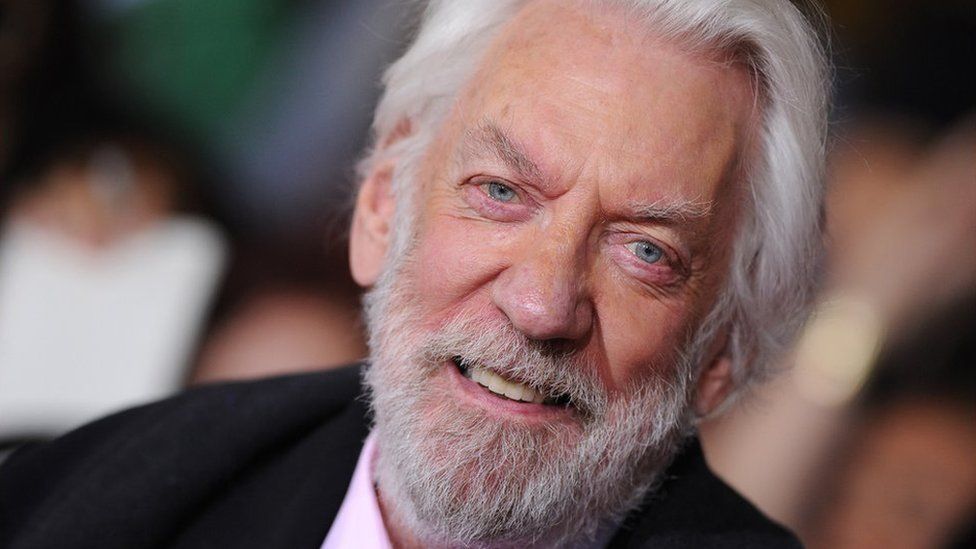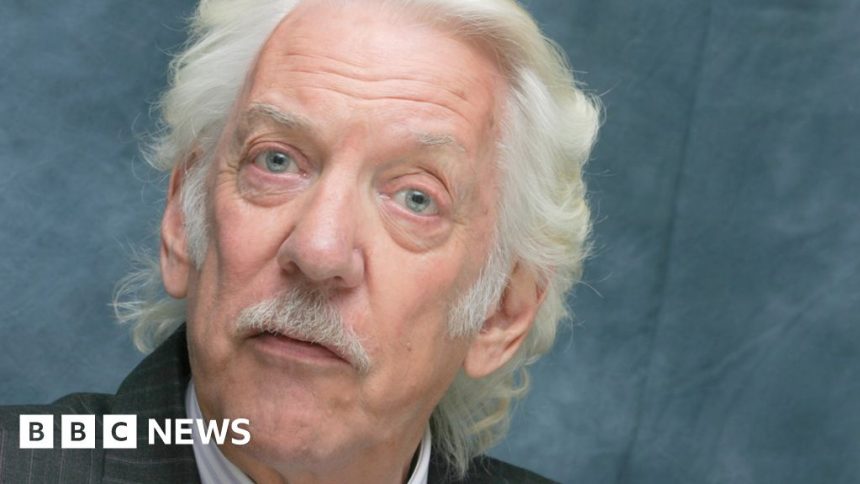Obituary: Donald Sutherland
-
Published

With almost 200 credits to his name and 6ft 3in to his frame, the late Donald Sutherland cast a literal and figurative shadow over his industry for almost 50 years.
Born in July 1935 in Saint John, New Brunswick, he was a radio news reporter in his youth and graduated from the University of Toronto with a degree in engineering.
But it was not long before the acting bug took hold, prompting him to leave his native Canada and travel to London in 1957.
After an unrewarding stint studying at the London Academy of Music and Dramatic Art (Lamda), he spent 18 months at Perth Repertory Theatre in Scotland.
“It was the first theatre I ever played where the audience actually laughed when I was being funny,” he told the Daily Record in 2013.
“The response I got from audiences gave me confidence and security for the first time.”
Donald Sutherland appeared in Dr Terror’s House of Horrors in 1965
Small roles in British film and television followed, among them appearances alongside Christopher Lee in the horror films Castle of the Living Dead and Dr Terror’s House of Horrors.
The first of these was directed by Warren Kiefer, whose surname Sutherland gave to his oldest son Kiefer when he was born shortly afterwards.
Other roles around this time included parts in episodes of The Saint, one of which was directed by its star Roger Moore.
It was on the strength of that episode that Sutherland landed his breakthrough role in World War II action film The Dirty Dozen.
Sutherland was not the first choice to play irreverent soldier Vernon Pinkley, one of 12 outcasts chosen by Lee Marvin’s major for a suicide mission behind enemy lines.
But director Robert Aldrich was so impressed by the scene in which Pinkley impersonates a general that his part was expanded.
Sutherland’s eye-catching performance led him to winning one of the lead roles in M*A*S*H, a satirical comedy about medics in the Korean War.
Donald Sutherland as Captain “Hawkeye” Pierce in M*A*S*H
His character, Captain Benjamin Franklin “Hawkeye” Pierce Jr, uses insubordination and gallows humour to deal with the daily grind of combat and carnage.
Sutherland’s off-kilter presence saw him land another war film role as the appropriately named Sergeant Oddball, in Kelly’s Heroes.
Yet he was on more restrained form in 1971’s Klute, playing a detective whose hunt for a missing person is assisted by a high-priced call girl.
Jane Fonda was Sutherland’s co-star in Alan J Pakula’s film and won an Oscar for her role.
Donald Sutherland and Jane Fonda in Klute
The politically active couple dated for two years, but the romance did not last. “It was a wonderful relationship right up to the point we lived together,” he would later remark.
Another sexually charged thriller, 1973’s Don’t Look Now, took Sutherland to Venice under Nicolas Roeg’s direction.
The film featured a sex scene of such frankness it was widely believed he and co-star Julie Christie had had sex for real – a rumour Sutherland later discounted.
Sutherland continued to collaborate with auteurs, playing a sadistic fascist in Bernardo Bertolucci’s 1900 and the title role in Federico Fellini’’s Casanova.
A poster for Nicholas Roeg’s Don’t Look Now – starring Donald Sutherland and Julie Christie
Fellini later said he had cast the actor as the fabled lothario because he was “a sperm-filled waxwork with the eyes of a masturbator”.
The 1970s also saw him play an IRA member in The Eagle Has Landed, a pot-smoking college professor in National Lampoon’s Animal House, and the lead in the 1978 remake of Invasion of the Body Snatchers.
The 1980s began with Sutherland playing the father of a suicidal teenager in Robert Redford’s Oscar-winning Ordinary People.
The decade also saw him play a British sergeant major in Hugh Hudson’s Revolution and appear with Kate Bush in the video for her 1985 track Cloudbusting.
Sutherland kept up his prodigious work rate in the 1990s, appearing in such films as Backdraft, JFK, Six Degrees of Separation and A Time to Kill.
Donald Sutherland with his actor son, Kiefer Sutherland
The latter saw him appear alongside his actor son Kiefer, who had made his first screen appearance in 1983’s Max Dugan Returns, another of his father’s films.
Sutherland turned to television in the 2000s, appearing in such series as Dirty Sexy Money and Commander-in-Chief.
In recent years, though, his role as the venal President Snow in the Hunger Games franchise has seen him embraced by a new generation of film fans.
“I hadn’t even heard of the [Suzanne Collins] books, but it became patently apparent to me that this was something,” he told the Telegraph, in 2015.
“It was the first thing I’d read in years that could become a creative political stimulus for young people.”
Donald Sutherland starred with Jennifer Lawrence in the Hunger Games films
Sutherland was married three times. His first marriage, to former child actress Lois Hardwick, lasted from 1959 to 1966.
His second marriage, to actress Shirley Douglas, lasted from 1966 and 1971 and produced two children, son Kiefer and daughter Rachel.
He went on to have three sons, Roeg, Rossif and Angus, with his third wife, Canadian actress Francine Racette.
Sutherland was never nominated for an Oscar but received an honorary Academy Award in 2017.
His only British Academy Award (Bafta) came in 1974, in recognition of his work in Don’t Look Now and Steelyard Blues.






